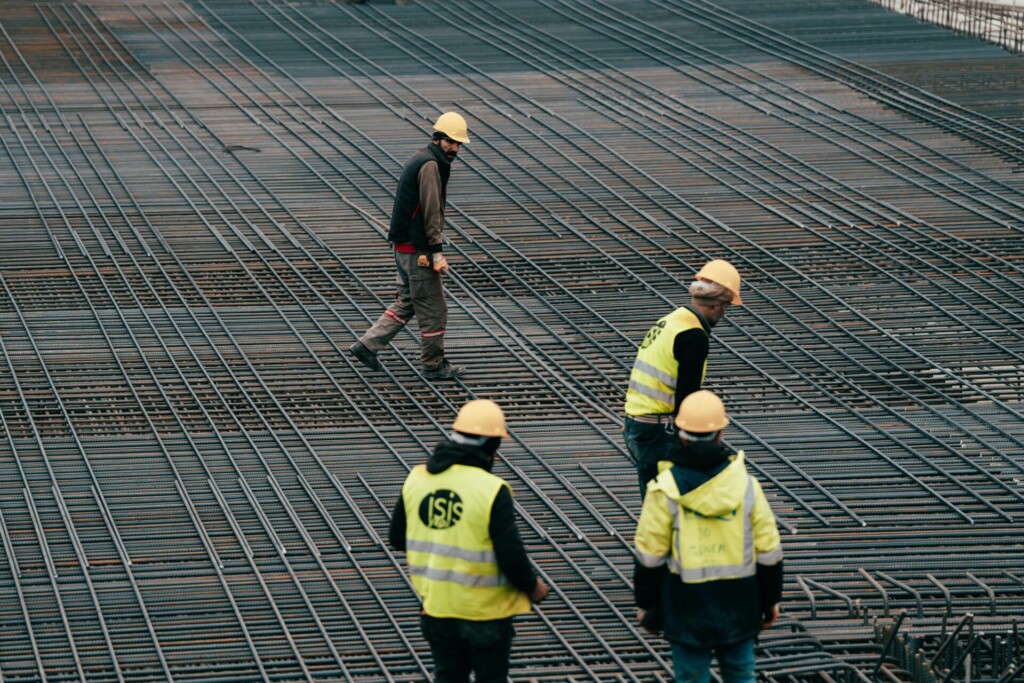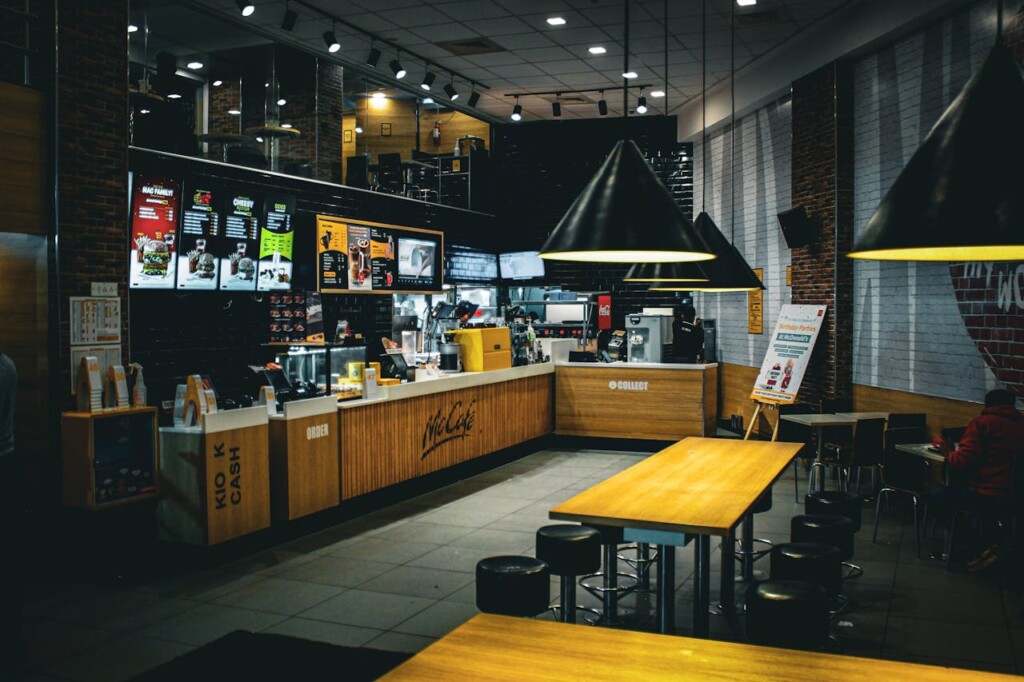McDonald’s golden arches in Manhattan look identical to those in Miami. That consistency stems from franchise construction, where franchisors control every detail of the build-out process. Brand standards dictate everything from floor finishes to kitchen layouts, ensuring customers receive the same experience regardless of location.
Franchise construction goes beyond typical commercial projects by requiring corporate approvals, approved vendors, and strict adherence to predetermined specifications. We coordinate not just with local authorities and property owners, but also with franchisor design teams who monitor compliance at every phase. This multi-layered approval process creates tighter timelines and leaves little room for field adjustments that might compromise brand consistency.
How Does Franchise Construction Differ From Standard Construction?

When we execute franchise construction projects, we work within a framework that shapes every decision from design to final inspection. These distinctions create different workflows, stakeholder relationships, and project management approaches compared to standard commercial builds.
Design Control And Customization Limits
Franchise projects arrive with corporate-approved blueprints that define nearly every element of the build. We follow detailed specifications for layout configurations, material selections, and even installation methods. The franchisor’s design team has already determined fixture placement, color schemes, and spatial relationships to maintain brand consistency across all locations.
Standard construction projects allow us to collaborate directly with property owners on customization decisions. We can suggest alternative materials based on local availability or budget considerations. Design modifications happen through direct communication with the owner rather than corporate approval processes.
This difference affects our preconstruction planning significantly. For franchise work, we focus on understanding and implementing predetermined standards. For standard projects, we spend more time in design development and value engineering discussions.
Approval Processes And Sign-Off Requirements
Franchise builds require multiple layers of approvals beyond standard local permitting. We coordinate with corporate design teams, brand consultants, and regional managers throughout the construction process. Key milestones often need franchisor sign-off before we can proceed to the next phase.
These additional approvals can extend project timelines if not properly managed. We build franchisor review periods into our schedules and maintain clear communication channels with corporate representatives. Document submittals follow specific formats and timing requirements set by the franchise system.
Standard construction projects typically involve approvals from the property owner, architect, and local authorities only. This streamlined approval process allows for quicker decision-making and more flexible project adjustments during construction.
Materials And Vendor Requirements
Franchisors maintain approved vendor lists and mandate specific materials to ensure brand consistency. We source finishes, fixtures, and equipment from predetermined suppliers, often at negotiated corporate rates. These specifications can include everything from flooring materials to light fixtures and signage systems.
The mandated materials approach affects our procurement strategies. We coordinate with approved suppliers early in the process and plan for potentially longer lead times on specialized franchise-specific items. Quality control becomes critical since deviations from specified materials can require costly corrections.
Standard construction allows us more flexibility in material selection and vendor relationships. We can suggest cost-effective alternatives, source locally when beneficial, and leverage our established supplier networks. This flexibility can lead to cost savings but lacks the bulk purchasing power that franchise systems provide.
Timeline Pressures And Opening Schedules
Franchise construction often operates under tighter deadlines, especially when opening dates are publicly announced or coordinated with marketing campaigns. We manage construction schedules that account for franchisor approval periods, specialized equipment delivery, and staff training requirements before opening.
The corporate nature of franchise operations means delays can affect broader business plans and marketing initiatives. We build detailed schedules with contingencies for potential approval delays or material delivery issues specific to franchise requirements.
Standard projects typically offer more schedule flexibility. While deadlines remain important, we can often negotiate timeline adjustments with property owners based on site conditions or unexpected challenges without affecting corporate-wide initiatives.
Cost Structures And Budget Considerations
Franchise construction costs reflect the premium nature of specified materials and systems. While corporate-negotiated pricing can provide some cost advantages, the lack of substitution flexibility can result in higher material costs compared to standard builds where we can suggest alternatives.
We work within budget structures that account for franchisor fees, specialized equipment, and compliance requirements. Cost overruns in franchise work often require corporate approval for changes, adding complexity to budget management.
Standard construction budgets allow for more dynamic cost management. We can suggest material substitutions or construction method changes to address budget constraints. This flexibility helps control costs but requires more active value engineering throughout the project.
Stakeholder Coordination And Communication
Franchise projects involve multiple stakeholders including corporate design teams, brand representatives, approved suppliers, and local management. We coordinate communication across these various parties while maintaining compliance with corporate standards and local requirements.
The corporate stakeholder structure means decisions often require multiple approvals and clear documentation. We maintain detailed project records and ensure all changes align with brand standards and corporate policies.
Standard construction typically involves fewer stakeholders, allowing for more direct communication and quicker decision-making. We work primarily with the property owner, design team, and local authorities, streamlining the coordination process but requiring more direct project management from our team.
What Planning And Due Diligence Steps Come First?
The franchise agreement serves as your blueprint for construction compliance. We examine the Franchise Disclosure Document alongside the franchise agreement to map out every mandatory design element, approved contractor requirement, and approval milestone that could delay your project. This upfront review prevents costly surprises when the franchisor flags non-compliance issues mid-construction.
Deadlines embedded in franchise agreements often tie to marketing launches or seasonal openings. Missing these dates can mean lost revenue during peak periods. We identify each franchisor approval checkpoint early, then sequence our construction phases to hit every milestone without rushing quality or safety protocols.
Site selection demands both franchise compliance and construction feasibility. Zoning regulations must align with the intended franchise use before any lease commitment. We verify that the zoning classification permits the specific franchise operations, from drive-through windows to late-night service hours. ADA compliance goes beyond basic accessibility requirements to include reach ranges, clear floor space, and accessible routes that work within brand layout standards.
Confirming use alignment protects against lease complications that can derail entire projects. We ensure the property owner understands the franchise concept and any structural modifications required. Some franchises need specialized ventilation, grease management, or electrical loads that standard commercial spaces cannot support without significant upgrades.
Market research and competition analysis inform space optimization decisions within brand guidelines. Demographics reveal customer flow patterns that influence aisle widths and service zone placement. High-volume locations may need wider aisles and additional queue management, while suburban sites might prioritize family seating configurations. Customer patterns also guide counter heights, display positioning, and accessibility features that enhance the user experience while meeting franchisor standards.
How Should Budgets And Cost Structures Be Built?

Franchise construction budgets typically range from $100,000 to $500,000 or more, depending on concept size, location, and brand requirements. Quick-service restaurants often fall on the lower end, while full-service concepts or specialized franchises with complex buildouts reach higher totals. Location factors like urban areas with strict codes or remote sites requiring utility extensions also push budgets upward.
We build our budgets using clear line items that capture all project components. Site preparation includes demolition, clearing, grading, and base utilities. Structural work covers foundations, framing, and core building systems. MEP encompasses electrical, plumbing, and HVAC installations tailored to franchise specifications. Finishes include flooring, walls, ceilings, and millwork that meet brand standards.
FF&E represents a substantial portion of franchise budgets. This category covers equipment, furniture, fixtures, and specialized systems like point-of-sale hardware or kitchen equipment. Permit fees and inspection costs vary by jurisdiction but must be factored early. Building departments charge differently for plan review, construction permits, and final inspections.
Understanding Soft Costs And Hidden Expenses
Soft costs routinely add 10 to 15 percent to franchise construction budgets. These include design fees, project management, temporary utilities, and administrative overhead. Architectural services for franchise compliance reviews and permit drawings represent significant expenses. Project management costs cover coordination between franchisors, contractors, and local authorities.
Temporary utilities keep construction moving but add ongoing monthly charges throughout the build period. These services include temporary power for tools and lighting, water for concrete work and cleanup, and waste disposal for construction debris. Site security and temporary fencing may be required in certain locations.
Rebranding cycles create long-term costs that franchisees must consider. Most franchise agreements require periodic updates to maintain current brand standards. These cycles typically occur every five to seven years and can involve substantial interior renovations or complete buildout updates.
Contingency Planning For Project Unknowns
We recommend holding 10 to 20 percent contingency for franchise construction projects. Site-related issues frequently emerge during construction, including unexpected soil conditions, utility conflicts, or structural complications. Older buildings being converted for franchise use often reveal hidden problems once demolition begins.
Utility tie-ins present common challenges that eat into budgets. Electrical service upgrades, gas line extensions, or water main connections can exceed initial estimates. Permit delays also trigger contingency use when extended timelines increase general conditions costs and push back opening dates.
Weather delays, material price fluctuations, and change orders from franchisor requirements all justify maintaining adequate reserves. We structure contingencies as separate line items rather than percentage markups to maintain transparency and control spending decisions.
Financing Options And Cost Coverage
Construction costs for meeting brand standards fall primarily on franchisees. Some landlords provide tenant improvement allowances that offset portion of buildout expenses, particularly in competitive retail markets. These allowances typically cover basic improvements like flooring, paint, and standard electrical work.
SBA loans offer attractive terms for franchise construction financing. The 7(a) program supports working capital and equipment purchases, while 504 loans target real estate and major fixed assets. Both programs feature longer repayment periods and lower down payment requirements than conventional financing.
Bank loans provide faster processing but often demand higher down payments and shorter terms. Equipment leasing spreads major equipment costs over time, preserving cash flow during the critical opening period. Some franchisors maintain relationships with preferred lenders familiar with their construction requirements and typical project costs.
Private investors represent another financing path for franchise owners planning multiple locations. Equity partnerships can provide construction capital in exchange for ownership stakes or revenue sharing arrangements.
What Does Effective Build-Out And Multi-Site Management Look Like?
The franchise build-out process follows specific steps that we execute in sequence. We confirm franchisor requirements first, then select an appropriate site and complete design within brand parameters. Next, we secure permits and approvals from both local authorities and corporate teams. Construction begins after all approvals are in place, followed by equipment ordering and installation. Staff training and marketing preparation occur simultaneously, leading to final walk-throughs and compliance checks before opening.
During construction, we track our schedule closely against established milestones. Securing the certificate of occupancy requires coordination between our field teams and local building departments. We maintain detailed punch lists throughout the project, addressing items systematically to avoid delays at substantial completion.
Multi-Site Rollout Challenges
Multi-site franchise rollouts present distinct risks that can derail entire programs. Budget overruns compound across locations when cost controls fail. Quality standards slip when teams lack consistent oversight across dispersed sites. Delays cascade through opening schedules when planning falls short or communication breaks down between corporate teams and field crews.
Poor planning creates the most significant threat to multi-site success. Sites with different layouts, utilities, or local code requirements demand individual attention within standardized processes. Communication gaps between project managers, site teams, and corporate stakeholders amplify these challenges. When information doesn’t flow consistently, decisions get delayed and rework increases.
Strategies For Multi-Site Success
We create detailed plans for each site that account for local conditions while maintaining brand consistency. Clear role assignments prevent confusion about who handles permits, inspections, and corporate approvals at each location. Realistic deadlines include contingencies for site-specific challenges like utility connections or structural modifications.
Resource management across multiple sites requires careful coordination. We track labor, equipment, materials, and time allocation using centralized systems that provide visibility across all active projects. Technology supports this effort through integrated platforms for scheduling, document control, and design management. Construction management software enables real-time financial tracking and helps prevent budget overruns through early warning systems.
Consistent communication keeps all stakeholders aligned throughout the rollout process. We maintain regular update schedules and use standardized reporting formats across sites. Document management software centralizes plans, permits, and approvals, ensuring teams work from current information. This systematic approach reduces errors and accelerates decision-making when issues arise.
Conclusion And Next Steps

Franchise construction demands a different approach than standard commercial projects. The precision required to meet brand standards, navigate multiple approval layers, and deliver within tight timelines makes this work uniquely challenging. We treat brand standards with the same rigor as building codes because deviations can jeopardize franchise agreements and future business relationships.
Success starts with comprehensive due diligence. Confirm zoning compatibility and ADA compliance before committing to any site. Build budgets that account for soft costs and maintain adequate contingencies for unexpected challenges. Manage construction timelines through disciplined quality control, thorough documentation, and systematic punch list closure. For multi-site rollouts, we standardize processes and maintain consistent communication protocols across all locations to prevent the delays and quality issues that plague poorly coordinated projects.
Ready to navigate your franchise construction project with confidence? Contact EB3 Construction to work with experienced professionals who understand franchise requirements.




